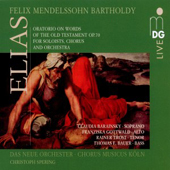
ESSENTIAL RECORDINGS

MDG 6021656
"The oratorio is completely outmoded" declared Richard Wagner in the 1830s. But yet, in 1846,
Felix Mendelssohn premiered his new oratorio Elijah, which was to become highly regarded as
one of the best and most enduring in the genre. One explanation for that might very well be as follows. The oratorio was a musical
vehicle of the late Baroque and early Classical eras, and even though Mendelssohn is considered a composer of the romantic period
like Schumann and Brahms, he was so much more a Classicist than a Romantic. Therefore his antiquarian tendencies, along with
a sense for the dramatic, lent themselves very well to the composition of one of the best oratorios ever written. This work not
only bears the influence of Bach in the choral segments and the impact of Beethoven in the orchestral writing, it also brings an
added lyricism within the solo vocal passages unheard of until then.
Over time, many interpretations and recordings of this work have shown a tendency to over indulge in the dramatic aspects within
the music, and to ignore the composer's many indications and markings for swift tempos and dynamic contrasts. Conductor
Christoph Spering, one of the pioneers of historical performance practice, removes the many layers of patina to uncover
the essence of the work, and delivers a focused account. Even though this is a dramatic work based on serious subject matter of
Biblical proportions, Spering's approach reveals its Classical and Baroque roots, and as in Bach's music, gives it a steadfast
momentum and sharp dynamic contrasts. The Chorus Musicus Köln and the Das Neue Orchester
(The New Orchestra), both founded by Christoph Spering, have established themselves as specialists of historical performance
practice, and produce a clean, focused sound tailor made for this type of music. Add to all that four accomplished and versatile
singers who convey their various roles here very well, and the fact that this recording was captured 'live', and the end results are
a brisk, uplifting and revelatory rendition of this important work.
Jean-Yves Duperron - November 2010